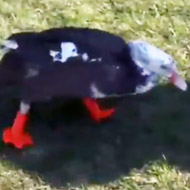Technology teacher saves duck with 3D printed feet

Phillip the duck is now learning to find his feet again.
A duck who lost both his feet to frostbite can now waddle again after being fitted with a pair of 3D printed boots.
The duck, affectionately named Phillip, was rescued by school teacher Vicki Rabe-Harrison from the US State of Wisconsin.
Sadly his feet were in such a bad way that she thought the only option would be to put him down.
In a last-ditch attempt to save Phillip, Ms Harrison reached out to technology teacher Jason Jischke who owned a 3D printer.
Together with his students, Mr Jischke immediately began working on a prototype for the injured bird.
After a few weeks of trail and error, Phillip was fitted with his new feet and can be seen in a video taking on his first few steps.
Speaking to The Telegraph, Ms Harrison said: "He picked it up real fast and I'm sure he'll learn to balance again, and be able to waddle around with all the other ducks.”
Phillip the duck is now learning to find his feet again and will shortly be rehomed to an animal rescue centre.
Image (C) World of News/Youtube



 FIVP has shared a survey, inviting those working in independent practice to share their views on the CMA's proposed remedies.
FIVP has shared a survey, inviting those working in independent practice to share their views on the CMA's proposed remedies.